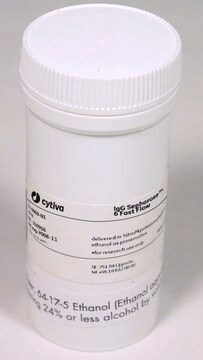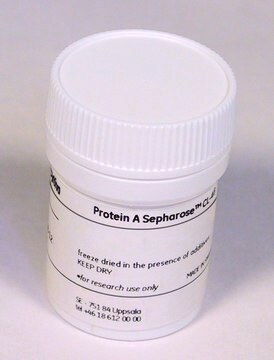A6284
Human IgG−Agarose
suspension
Sinonimo/i:
IgG Agarose
Autenticatiper visualizzare i prezzi riservati alla tua organizzazione & contrattuali
About This Item
Prodotti consigliati
Coniugato
agarose conjugate
Livello qualitativo
Stato
suspension
Grado di funzionalizzazione
≥5 mg per mL
Matrice
Cross-linked 4% beaded agarose
Attivazione matrice
cyanogen bromide
Braccio spaziatore
1 atom
Temperatura di conservazione
2-8°C
Descrizione generale
Human IgGs are glycoprotein antibodies that contain two equivalent light chains and a pair of identical heavy chains. IgGs have four distinct isoforms, ranging from IgG1 to IgG4. These antibodies regulate immunological responses to allergy and pathogenic infections. IgGs have also been implicated in complement fixation and autoimmune disorders.
Applicazioni
IgG-Agarose is an immuno-adsorbent that can be used to affinity purify antibodies, remove species-specific cross-reacting antibodies or remove contaminating antibodies from an antiserum preparation. Typically, cross-reacting antibodies may be removed from an antiserum preparation using an equal volume of IgG-Agarose (resin volume). However, the resin to antiserum ratio will vary with individual applications.
Tandem affnitiy purification pulldown was performed in yeast cultures using agarose-linked human IgG. Supernatants were mixed with 30μl of agarose beads overnight.
Stato fisico
Suspension in 0.5 M NaCl containing preservative.
Esclusione di responsabilità
Unless otherwise stated in our catalog or other company documentation accompanying the product(s), our products are intended for research use only and are not to be used for any other purpose, which includes but is not limited to, unauthorized commercial uses, in vitro diagnostic uses, ex vivo or in vivo therapeutic uses or any type of consumption or application to humans or animals.
Codice della classe di stoccaggio
10 - Combustible liquids
Classe di pericolosità dell'acqua (WGK)
WGK 3
Punto d’infiammabilità (°F)
Not applicable
Punto d’infiammabilità (°C)
Not applicable
Scegli una delle versioni più recenti:
Possiedi già questo prodotto?
I documenti relativi ai prodotti acquistati recentemente sono disponibili nell’Archivio dei documenti.
Graciela C Calabrese et al.
Thrombosis research, 105(6), 537-541 (2002-07-02)
Antithrombin (AT) high affinity of unfractionated heparin (UFH) resides in a specific pentasaccharide sequence. Heparin also regulates complement activity on the classical and the alternative pathways. Most experimental pieces of evidence accumulated show that these important activities reside in different
Pierre Fotso et al.
The Journal of biological chemistry, 280(30), 27613-27623 (2005-06-04)
The conserved oligomeric Golgi (COG) complex is an evolutionarily conserved peripheral membrane oligomeric protein complex that is involved in intra-Golgi protein trafficking. The COG complex is composed of eight subunits that are located in two lobes; Lobe A contains COG1-4
Graciela C Calabrese et al.
Thrombosis research, 113(3-4), 243-250 (2004-05-14)
Dermatan sulfate (DS) is a member of the family of structurally complex, sulfated, linear heteropolysaccharides called glycosaminoglycans (GAGs). It has a similar structure to heparin and heparan sulfate (HS), but with acetylgalactosamine replacing glucosamine, and the uronic acid moiety, mainly
A G Norden et al.
Clinical chemistry, 43(6 Pt 1), 957-962 (1997-06-01)
A novel interference with measurements of serum free thyroxine (FT4) caused by rheumatoid factor (RhF) is described. We found misleading, sometimes gross, increases of FT4 results in 5 clinically euthyroid elderly female patients with high RhF concentrations. All 5 patients
Yeon Jeong Kim et al.
Frontiers in plant science, 10, 667-667 (2019-06-14)
Control of protein turnover is a key post-translational control point in the oscillatory network of the circadian clock. Some elements, such as TOC1 and PRR5 are engaged by a well-described F-box protein, ZEITLUPE, dedicated to their proteolytic turnover to shape
Il team dei nostri ricercatori vanta grande esperienza in tutte le aree della ricerca quali Life Science, scienza dei materiali, sintesi chimica, cromatografia, discipline analitiche, ecc..
Contatta l'Assistenza Tecnica.








